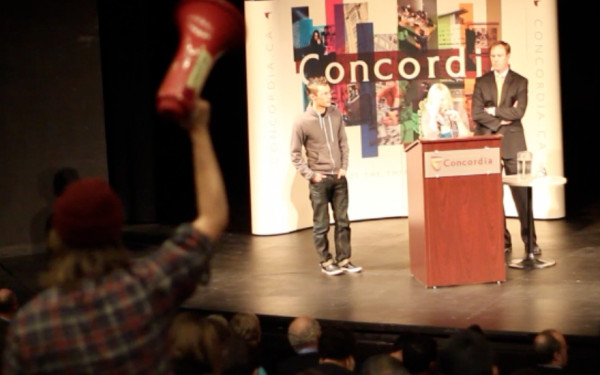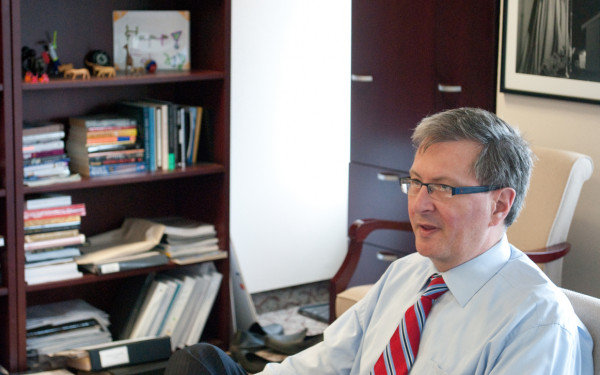Concordia University President Alan Shepard to Serve Second Term
Following a year of criticism for a large severance package, a pro-asbestos report, and student tribunals, Concordia University President Alan Shepard received better news on May 20.
It was announced he would serve a second term as president, in an email written by Norman Hébert Jr.—the Chair of both the university’s Board of Governors and the evaluation committee that decided to keep Shepard.
“I was very pleased to be reappointed at Concordia,” Shepard said in an interview last Wednesday.
The president credited his strong leadership team for the reappointment, and emphasized that implementing the university’s nine “strategic directions” will be his priority moving forward.
Shepard has been in office since 2012. His first term is ending on July 31, 2017. A president can only serve two terms, which normally last about five years each.
For the 2014-15 academic year, Shepard made $369,620 in salary, $69,765 in taxable benefits, and $40,231 in reimbursements, according to an audit obtained through an access to information request.
The president’s evaluation committee, which was comprised of 11 voting members—not counting the Chair—was created in December and included: Françoise Bertrand, Émilio Boulianne, Jean-Pierre Desrosiers, Hélène Fortin, Alex Macpherson, Ted McCormick, Alex Ocheoha, Maria Peluso, Johanne Sloan, Ted Stathopoulos, and Terry Wilkings.
“Since joining Concordia, Alan has been a strong advocate for the university, working tirelessly to strengthen relations with students, faculty, staff, alumni and friends,” Hébert Jr. wrote in the email. “His genuine respect and care for the university and its members has been evident.”
A year of tension between administration and student leaders
The news of his reappointment might not be fully accepted by the group Concordia Against Tribunals—or CATs for short.
The group has been demanding that Shepard drop charges against approximately two dozen student-protesters, who were targeted by three professors for their involvement in the spring 2015 strikes against austerity measures.
As an official co-complainant, Concordia hired mediators—one at the cost of $26,000—to settle the dispute between the professors and students informally.
Mediation ultimately failed for two out of the three professors, and many students received letters of reprimand from independent tribunal panels.
“It’s [Shepard’s] administration that set up this entire process and made it drag on for this long,” said Nora Fabre, a member of CATs, during a demonstration in March. “It could have been settled in a much different way, instead of wasting time, money and resources.”
Because the charges haven’t been dropped and the letters of reprimand were handed out, some elected undergraduate student politicians are currently prevented from serving on Concordia’s Senate and Board of Governors—the two highest decision-making bodies at the university.
After a debate that lasted over an hour at the April 22 Senate meeting, two proposals to change the university bylaw causing this issue failed to pass.
An ad hoc committee—which will include student representatives—has been set up to review the matter further, Shepard said during last Wednesday’s interview.
If the eligibility requirements don’t change, the executive of the Concordia Student Union—some of whom are affected by the bylaw—is mandated to take legal action against the university.
With files from Michelle Pucci and Vince Morello

_900_597_90.jpg)


_600_375_90_s_c1.jpg)


_1_600_375_90_s_c1.jpg)